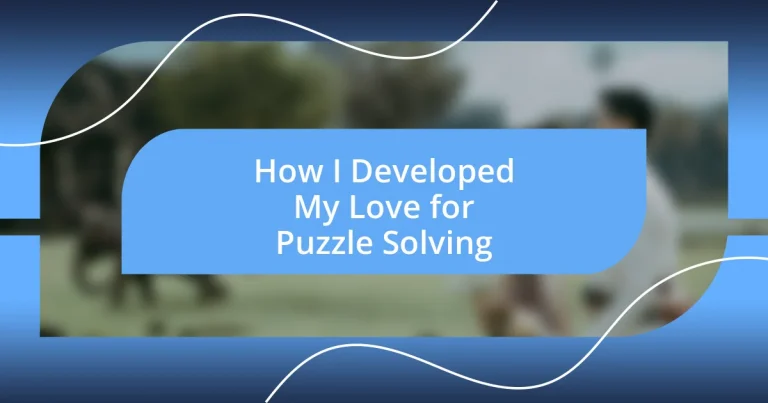Key takeaways:
- The author’s initial encounter with a jigsaw puzzle at their grandmother’s house sparked a lifelong love for puzzles, highlighting their emotional and cognitive benefits.
- Exploring various types of puzzles, such as crosswords and Sudoku, enriched the author’s experience, demonstrating that puzzle-solving encompasses collaboration and different skill sets.
- Engaging with puzzle communities, both online and offline, provided motivation and new strategies, reinforcing the idea that puzzle-solving can be a shared journey of learning and connection.
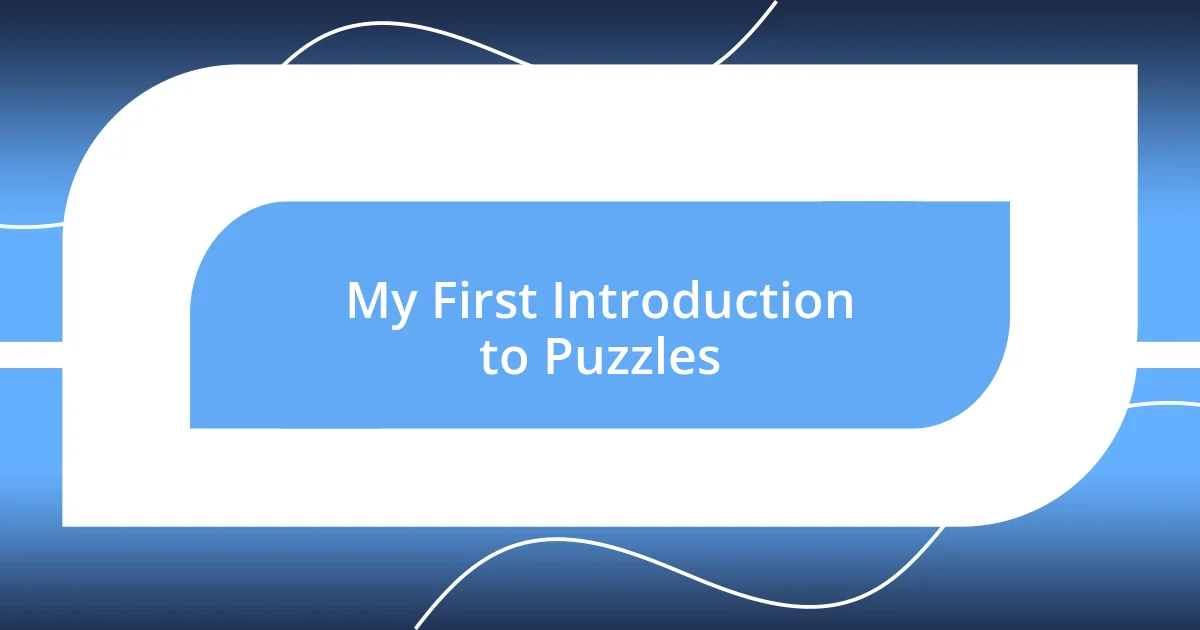
My First Introduction to Puzzles
I can still remember the first time I stumbled upon a jigsaw puzzle at my grandmother’s house. The box was old, the colors faded, but the challenge it promised was irresistible. Who knew that an innocent Sunday afternoon could turn into hours of cognitive joy and frustration?
As I sat cross-legged on the floor, pieces scattered around me like fallen leaves, a sense of determination washed over me. Each time a piece clicked into place, I felt a rush of satisfaction—almost like unlocking a hidden treasure. Have you ever experienced that moment when everything just clicks? It’s such a powerful feeling that hooked me right away.
My grandmother watched me struggle and succeed, a knowing smile on her face. She shared stories about how puzzles were her escape during tough times, and somehow, I felt a connection to that sentiment. It made me wonder: how could something as simple as a few cardboard pieces provide comfort and clarity in life’s chaos? That was my first taste of how puzzle-solving could be more than just a pastime; it could be a source of solace and fulfillment.
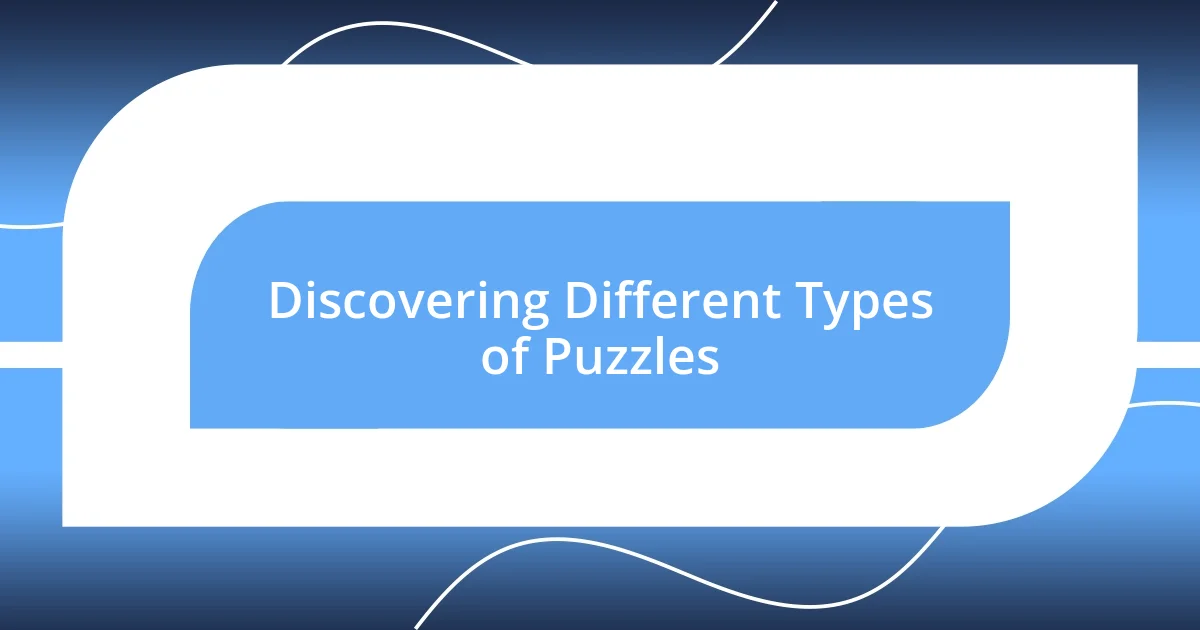
Discovering Different Types of Puzzles
Exploring different types of puzzles expanded my appreciation for this fascinating hobby. Each type offers a unique challenge and experience, capturing my interest in unexpected ways. For instance, logic puzzles require a different mindset than jigsaw puzzles, engaging my analytical side while providing the thrill of deduction.
Here’s a glimpse into the types of puzzles I’ve come to love:
- Jigsaw Puzzles: Beautiful images slowly reveal themselves piece by piece.
- Crossword Puzzles: These challenge my vocabulary and lateral thinking, often sparking fun memories.
- Sudoku: This number game somehow calms my mind while pushing my logic skills to the limit.
- Escape Room Puzzles: The adrenaline rush of solving clues in real time adds an exciting twist.
- Rubik’s Cube: The tactile nature of this 3D puzzle short-circuited my understanding of spatial relationships.
I remember the first time I tried a crossword puzzle; it felt like deciphering a secret code. Solving it with a friend turned into a rewarding collaboration, where each clue brought us closer. Each puzzle type brought new emotions, teaching me that puzzle-solving isn’t just about completion but also about the experiences shared along the way.
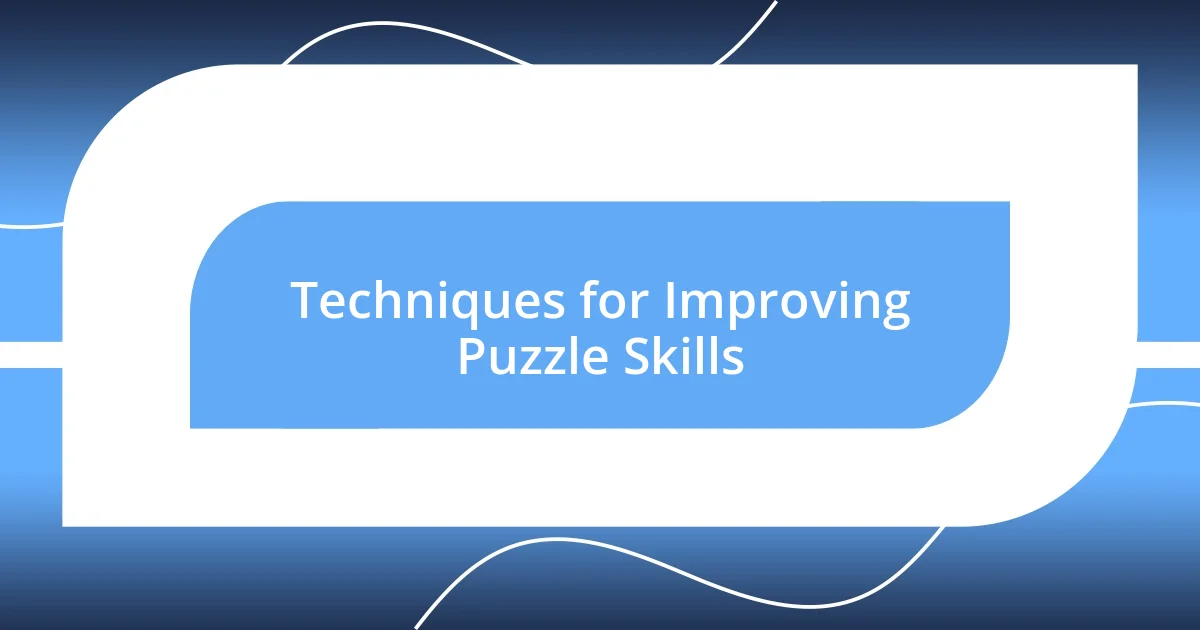
Techniques for Improving Puzzle Skills
I’ve discovered that consistent practice is one of the most effective techniques to improve my puzzle-solving skills. I remember dedicating just a few minutes each day to tackle different puzzles. Over time, I noticed a remarkable difference in my speed and accuracy. Have you ever taken a moment to reflect on how little improvements can lead to significant growth? Each solved puzzle became a stepping stone, sharpening my mind and boosting my confidence.
Another valuable technique is to incorporate strategic breaks while solving a particularly challenging puzzle. When I hit a wall, stepping away for a short while often allows my subconscious to work on the problem. It’s fascinating how a fresh perspective can change everything. I once spent hours trying to solve a difficult Sudoku before deciding to take a walk. Upon returning with a clear mind, I was able to effortlessly fill in the blanks, almost as if the solution had magically appeared!
Lastly, I’ve found that discussing puzzles with fellow enthusiasts can present new techniques and insights I might not have considered. Joining a local puzzle club introduced me to different solving strategies and thought processes. I remember one club night where a member shared their unique approach to jigsaw puzzles, emphasizing border pieces first. This mindset shift helped me appreciate the process of collaboration and collective learning, making puzzle-solving an even more enjoyable experience.
| Technique | Description |
|---|---|
| Consistent Practice | Dedicating regular time to solve puzzles leads to improved speed and accuracy. |
| Strategic Breaks | Taking breaks can help clear the mind and provide fresh perspectives on difficult puzzles. |
| Engaging with Others | Discussing puzzles with fellow enthusiasts provides new techniques and enriches the puzzle-solving experience. |
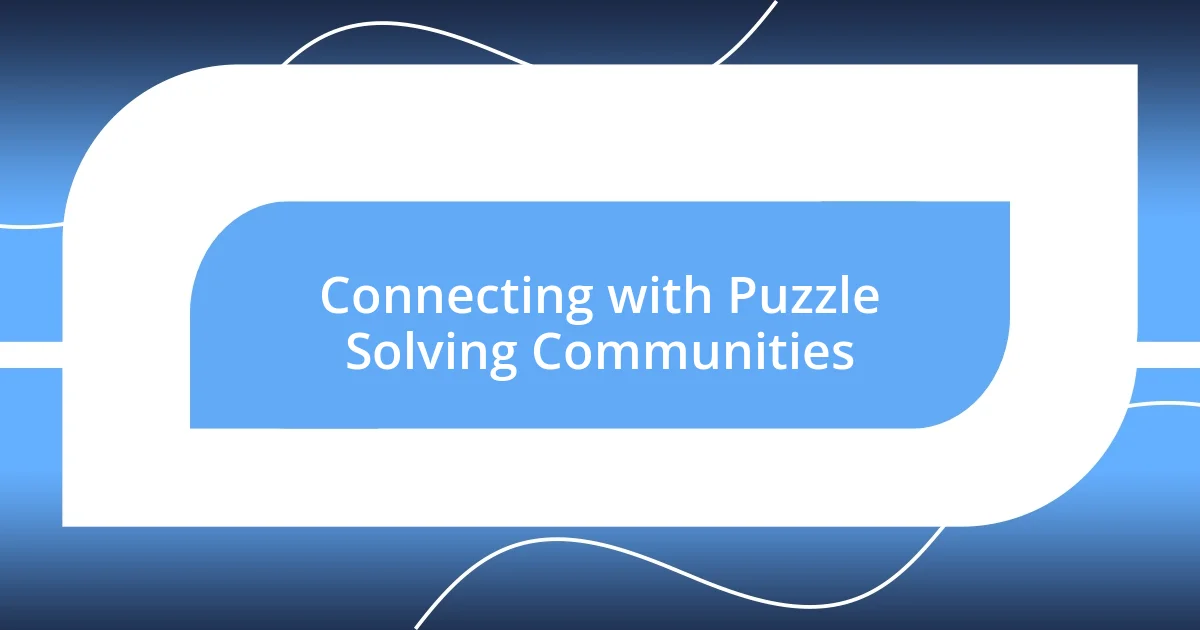
Connecting with Puzzle Solving Communities
Connecting with puzzle-solving communities has truly deepened my passion for this intricate hobby. I remember the first time I ventured into an online forum dedicated to puzzles. The excitement of seeing others share their “aha” moments mirrored my own experiences and made me feel instantly connected. Have you ever felt that rush of belonging when joining a community that shares your passion? That’s exactly how I felt, and it was exhilarating!
Attending local puzzle meetups also introduced me to a diverse group of enthusiasts. Each person brought a unique perspective that challenged my own. I vividly recall a lively discussion about unconventional strategies for solving crosswords, where one member revealed how they paid attention to the theme first. This approach opened my eyes, pushing me beyond my comfort zone and encouraging me to explore new methods. It’s fascinating how a simple share can shift your entire puzzle-solving mindset, isn’t it?
Social media groups have become another exciting avenue for connection. I often find myself scrolling through posts showcasing others’ completed puzzles, each one telling a story of hard work and persistence. Recently, a user shared their personal journey of solving a 1000-piece jigsaw puzzle that took a month to finish. I felt their triumph and, in turn, was inspired to tackle more complex puzzles myself. These communities serve as both a sounding board and a source of motivation, reminding me that, in puzzle-solving, we’re never truly alone.
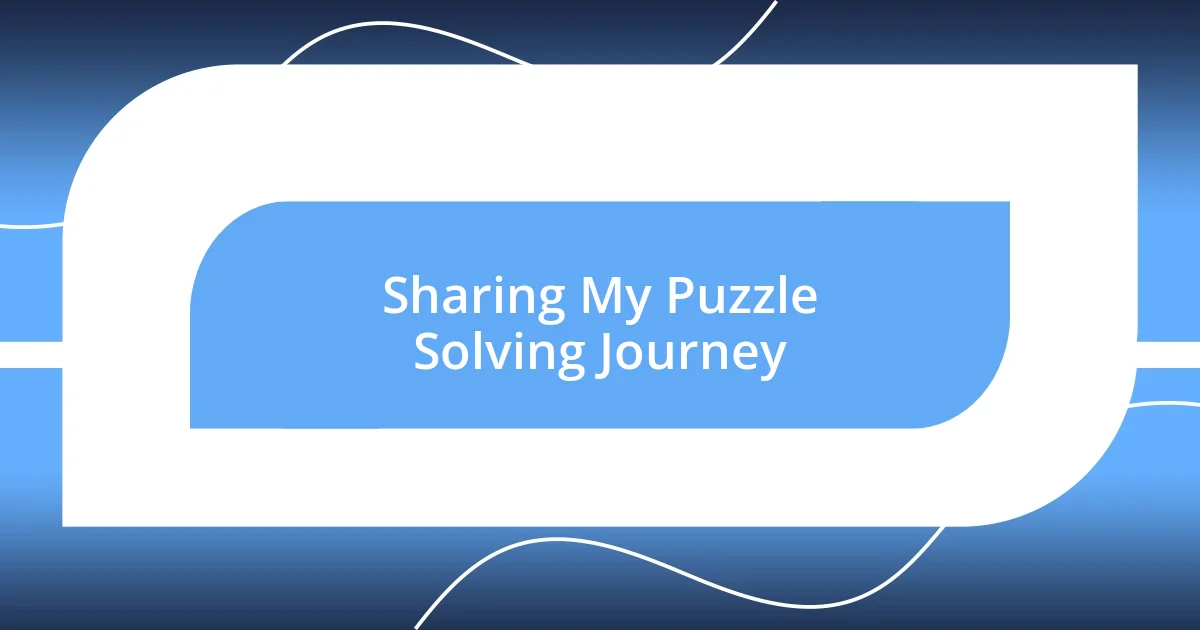
Sharing My Puzzle Solving Journey
Sharing my puzzle-solving journey has been an incredibly fulfilling experience. I still remember the thrill of my first crossword puzzle; it was both daunting and exhilarating. As I slowly filled in the squares, I felt a sense of accomplishment wash over me. Have you ever had that moment when you finally crack a tricky clue? It’s as if the puzzle is speaking to you, offering its secrets piece by piece.
Looking back, one of my proudest moments was solving a particularly intricate jigsaw puzzle during a rainy weekend. I spread the pieces across my dining table, the colors mixing in a chaotic swirl. At first, I felt overwhelmed, but after hours of placing pieces together, I found a rhythm. The satisfaction of completing the final section was unforgettable, filling my heart with joy and a sense of mastery. Isn’t it amazing how puzzles can transform a dull day into an exciting adventure?
Reflecting on my journey, I cherish the times spent discussing strategies with friends over coffee. I recall a light-hearted competition where each of us attempted to finish a Sudoku in the shortest time. The playful banter and shared moments of frustration and triumph made the experience feel like more than just a solving task—it became a celebration of our shared passion. Those interactions draw us closer, don’t they? Every puzzle becomes a shared experience, enriching our journeys in more ways than just the mental challenge.












